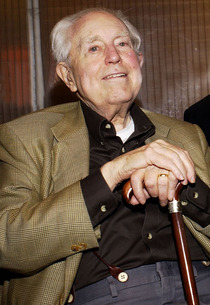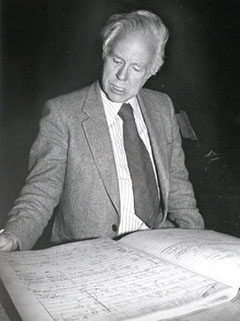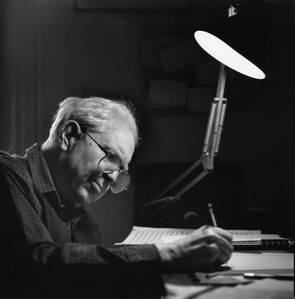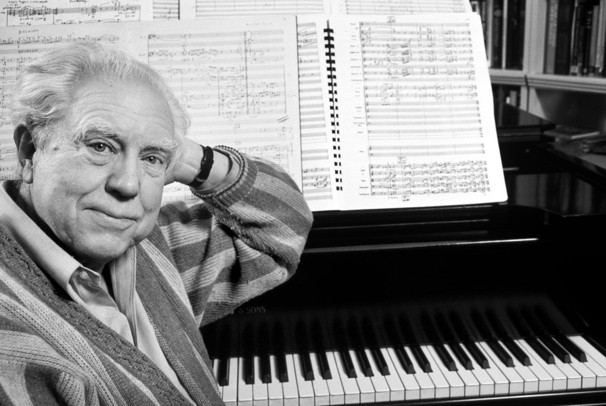<Back to Index>
- Composer Elliott Cook Carter, Jr., 1908
PAGE SPONSOR



Elliott Cook Carter, Jr. (December 11, 1908 – November 5, 2012) was a two - time Pulitzer Prize winning American composer. He studied with Nadia Boulanger in Paris in the 1930s, and then returned to the United States. After a neoclassical phase, he went on to write atonal, rhythmically complex music. His compositions, which have been performed all over the world, include orchestral and chamber music as well as solo instrumental and vocal works.
He was extremely productive in his later years, publishing more than 40 works between the ages of 90 and 100, and over 14 more after he turned 100 in 2008. His last work, 12 Short Epigrams for piano, was completed on August 13, 2012.
Carter's father, Elliott Carter Sr., was a businessman and his mother was the former Florence Chambers. The family was well - to - do. As a teenager, he developed an interest in music and was encouraged in this regard by the composer Charles Ives (who sold insurance to Carter's family). In 1924, a galvanized 15 year old Carter was in the audience when Pierre Monteux conducted the Boston Symphony Orchestra in the New York première of The Rite of Spring, according to a 2008 report. Carter was again in attendance in Carnegie Hall, on the occasion of his 100th birthday in 2008, when the orchestra, now under James Levine, again performed the Stravinsky piece as part of its tribute to Carter. Although Carter majored in English at Harvard College, he also studied music there and at the nearby Longy School of Music. His professors included Walter Piston and Gustav Holst. He sang with the Harvard Glee Club and did graduate work in music at Harvard, from which he received a master's degree in music in 1932. He then went to Paris to study with Nadia Boulanger (as did many other American composers). Carter worked with Boulanger from 1932 to 1935, and in that year received a doctorate in music (Mus.D.) from the Ecole Normale in Paris. Later that same year, he returned to the U.S. and wrote music for the Ballet Caravan.
From 1940 to 1944, he taught in the program, including music, at St. John's College in Annapolis, Maryland. On July 6, 1939, Carter married Helen Frost - Jones. They had one child, a son, David Chambers Carter. During World War II, he worked for the Office of War Information. He later held teaching posts at the Peabody Conservatory (1946 – 1948), Columbia University, Queens College, New York (1955 – 56), Yale University (1960 – 62), Cornell University (from 1967) and the Juilliard School (from 1972). In 1967, he was appointed a member of the American Academy of Arts and Letters. In 1981, he was awarded the Ernst von Siemens Music Prize, in 1985 the National Medal of Arts. He lived with his wife in the same apartment in Greenwich Village from the time they bought it in 1945 to her death in 2003.
On December 11, 2008, Carter celebrated his 100th birthday at Carnegie Hall in New York, where the Boston Symphony Orchestra and pianist Daniel Barenboim played his Interventions for Piano and Orchestra written that year. Between the ages of 90 and 100 he published more than 40 works, and after his 100th birthday he composed at least 14 more.
On February 7, 2009, he was given the Trustees Award (a lifetime achievement award given to non - performers) by the Grammy Awards.
He was on the faculty of the Tanglewood Music Center, where he gave annual composition master classes. In June of 2012, the French government named him a Commandeur de la Légion d'honneur.
Carter died of natural causes on 5 November 2012 at his home in New York City at age 103.
Carter's earlier works are influenced by Stravinsky, Harris, Copland and Hindemith, and are mainly neoclassical in aesthetic. He had a strict and thorough training in counterpoint, from medieval polyphony through Stravinsky, and this shows in his earliest music, such as the ballet Pocahontas (1938 – 39). Some of his music during the Second World War is frankly diatonic, and includes a melodic lyricism reminiscent of Samuel Barber.
His music after 1950 is typically atonal and rhythmically complex, indicated by the invention of the term metric modulation to describe the frequent, precise tempo changes found in his work. While Carter's chromaticism and tonal vocabulary parallels serial composers of the period, Carter does not employ serial techniques in his music. Rather he independently developed and cataloged all possible collections of pitches (i.e., all possible three - note chords, five - note chords, etc.). Musical theorists like Allen Forte later systematized these data into musical set theory. A series of works in the 1960s and 1970s generates its tonal material by using all possible chords of a particular number of pitches.
The Piano Concerto (1964 – 65) uses the collection of three - note chords for its pitch material; the Third String Quartet (1971) uses all four - note chords; the Concerto for Orchestra (1969) all five - note chords; and the Symphony of Three Orchestras uses the collection of six - note chords. Carter also makes frequent use of "tonic" 12 - note chords. Of particular interest are "all - interval" 12 - tone chords where every interval is represented within adjacent notes of the chord. His 1980 solo piano work Night Fantasies uses the entire collection of the 88 symmetrical - inverted all - interval 12 note chords. Typically, the pitch material is segmented between instruments, with a unique set of chords or sets assigned to each instrument or orchestral section. This stratification of material, with individual voices assigned not only their own unique pitch material, but texture and rhythm as well, is a key component of Carter's musical style. Carter's music after Night Fantasies has been termed his late period and his tonal language has become less systematized and more intuitive, but retains the basic characteristics of his earlier works.
Carter's use of rhythm can best be understood within the concept of stratification. Each instrumental voice is typically assigned its own set of tempos. A structural polyrhythm, where a very slow polyrhythm is used as a formal device, is present in many of Carter's works. Night Fantasies, for example, uses a 216 : 175 tempo relation that coincides at only two points in the entire 20+ minute composition. This use of rhythm is part of his goal to expand the notion of counterpoint to encompass simultaneous different characters, even entire movements, rather than just individual lines.
Carter developed his technique to further his artistic goals. His use of rhythm allows his music a structured fluidity and sense of time perhaps unique in classical music. The music also is overtly expressive and dramatic. He has said that "I regard my scores as scenarios, auditory scenarios, for performers to act out with their instruments, dramatizing the players as individuals and participants in the ensemble." He has also talked about his desire to portray a "different form of motion," in which players are not locked in step with the downbeat of every measure.
He said that such steady pulses reminded him of soldiers marching or horses trotting, sounds no longer heard in the late 20th century, and he wanted his music to capture the sort of continuous acceleration or deceleration experienced in an automobile or an airplane. While Carter's atonal music shows little trace of American popular music or jazz, his vocal music has demonstrated strong ties to contemporary American poetry. He set works of Elizabeth Bishop, John Ashbery, Robert Lowell, William Carlos Williams, Wallace Stevens, Ezra Pound and Marianne Moore. Several of his large instrumental works such as the Concerto for Orchestra or Symphony of Three Orchestras are inspired by twentieth century poets as well.
Among his better known works are the Variations for Orchestra (1954 – 55); the Double Concerto for harpsichord, piano and two chamber orchestras (1959 – 61); the Piano Concerto (1964 – 65), written as an 85th birthday present for Igor Stravinsky; the Concerto for Orchestra (1969), loosely based on a poem by Saint - John Perse; and the Symphony of Three Orchestras (1976). He has also written five string quartets, of which the second and third won the Pulitzer Prize for Music in 1960 and 1973 respectively. Symphonia: Sum Fluxae Pretium Spei (1993 – 1996) is his largest orchestral work, complex in structure and featuring contrasting layers of instrumental textures, from delicate wind solos to crashing brass and percussion outbursts.
In spite of a usually rigorous derivation of all pitch content of a piece from a source chord, or series of chords, Carter never abandons lyricism, and ensures that a text is sung intelligibly, sometimes even simply. In A Mirror on Which to Dwell (1975) (based on poems by Elizabeth Bishop) Carter writes colorful, subtle, transparently clear music; yet almost every pitch in the piece is derived from the content of a single sonority. Most of Carter's music is published by either G. Schirmer / Associated Music Publishers (works up to 1981) or Boosey & Hawkes (works since 1981).
Interventions for Piano and Orchestra received its premiere on December 5, 2008, by the Boston Symphony Orchestra conducted by James Levine featuring pianist Daniel Barenboim at Symphony Hall in Boston. The pianist reprised the work again with the BSO at Carnegie Hall in New York in the presence of the composer on his 100th birthday. Carter was also present at the 2009 Aldeburgh Festival to hear the world premiere of his song cycle On Conversing with Paradise, based on Ezra Pound's Canto 95 (from the section Rock - Drill) and one of Pound's 'Notes' intended for later Cantos, and usually published at the end of the Cantos. The premiere was given on June 20, 2009 by baritone Leigh Melrose and the Birmingham Contemporary Music Group conducted by Oliver Knussen.
Figment V for marimba with Simon Boyar was premiered in New York on 2 May 2009 and Poems of Louis Zukofsky for soprano and clarinet had its first performance by Lucy Shelton and Stanley Drucker at the Tanglewood Festival on August 9, 2009. The U.S. premiere of the Flute Concerto took place on February 4, 2010, with soloist Elizabeth Rowe and the Boston Symphony Orchestra conducted by James Levine. The last premiere of his lifetime was Dialogues II, written for Daniel Barenboim's 70th birthday and conducted in Milan in November 2012 by Gustavo Dudamel.

